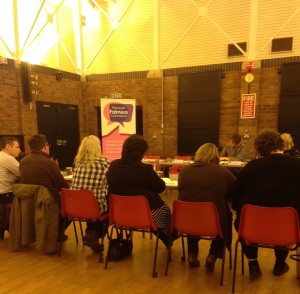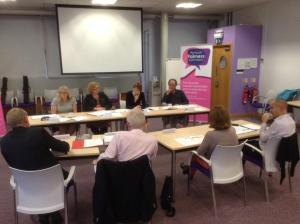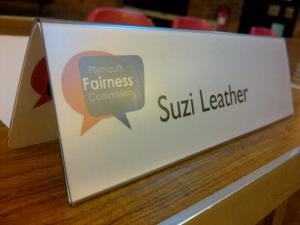Category Archives: Summer of Listening
Summer of Listening; Final Report
On Friday we released our Summer of Listening report which gave details into what is perceived as fair and unfair in Plymouth by its residents. It can be found here on our website.
Throughout the Summer of Listening, commissioners did just that – listened. They listened to people across the city who may not have otherwise had a chance to have their say by using a number of methods of collecting information. This included satellite meetings with community groups, walkabouts, street surveys, e-surveys, select committees and listening events. The report not only states what people found to be unfair about the city, but also listened to what was perceived to be fair.
The findings in this report will be used to shape the final recommendations which will be presented in March 2014, not just to the council, but to leaders all across the city.
A summary of the issues that the report found to be unfair:
Financial issues including the cost of living, Housing: lack of affordable homes and lack of suitable housing, Education: including the differences in quality of provision, the allocation system, the 11+ and a difference in attainment by area, Lack of support for those with mental health issues, Cost of public transport, Access to healthcare and dentistry, Affordable healthy food, Discrimination amongst race, disabilities and LGBT groups, alcohol and drug related abusive and anti-social behaviour, Barriers to involvement in community activities, Health inequalities and obesity, High cost and availability of parking in the city centre, Lack of employment opportunities for young people, Barriers to successful engagement in apprenticeship schemes, Absence on major employers in the city, Number of closed shops in the city centre, Large number of national chains at the expense of local shops and Small businesses lacking the ability to influence city policy
A summary of the issues that the report found to be fair:
Education: Anti bullying, equality of access and good standard of teaching, Access to adult learning, Social housing: allocation and investment in new build properties, Good healthcare provision, Citizen engagement opportunities, Abusive and anti-social behaviour issues are dealt with promptly by police of PCSOs, Current mix of shops meet local needs, Parking: acceptable costs and appropriate number of spaces, Park and ride facilities and Opportunities for employment and skills development
The next step is for the Plymouth Fairness Commission to release its Interim Report/Position Statement which will highlight the key areas of concern which will be taken from the Summer of Listening report.
Select Committee; Mental Health
At yesterday’s Mental Health Select Committee we were joined by Julia Moore – Mental Health and Liaison Officer from Devon and Cornwall Police, Lin Walton – Mental Health Commissioner NEW Devon CCG, Sarah Lees – Office of the Director of Public Health, Sharon Claridge – Plymouth MIND, David Mcauley – Community Mental Health Services and Paul Boyes – Vice Principal at Lipson Co-operative Academy.
Many points were discussed and below are a selection of these points and possible ways of improving the current situation:
There is a high need for mental health services for children in Plymouth and some children can be waiting for CAMHS (Child and Adolescent Mental Health Services) for up to six months.
There are high levels of mental health needs because of key risk factors in Plymouth which includes; deprivation, unemployment, poor housing and drugs and alcohol.
Some people have to go to Exeter for care, sometimes further, depending on their specific needs as some services are not available in Plymouth.
There hasn’t been, and there should be more spend on prevention and promotion of mental health issues in Plymouth.
Devon and Cornwall police has one of the highest numbers of people detained under Section 136 of the Mental Health Act. It has been known for children as young as 12 to be arrested under this section because there is nowhere else for them to go.
Plymouth has the highest levels in the country of self-harm.
We need to look at what we can do to create extra value. For example, GPs spend an extra 10 minutes with their patient to identify the root cause and direct them to somewhere catering to their specific needs as opposed to a generalised process.
There needs to be focus on stopping people from feeling stigmatised if they admit to having an issue.
The Plymouth Fairness Commission would like to thank all those that attended the select committee for their valuable input which will be used to help form the commission’s recommendations
Summer of Listening Report
We have reached exciting times at Plymouth Fairness Commission as we are working on the finishing touches of our Summer of Listening report.
The Summer of Listening report marks a vital time for the Plymouth Fairness Commission – it represents that despite the journey left to go, we have come such a long way in what has been achieved so far.
On Wednesday the commissioners will be meeting to confirm the key findings from all of the events they have participated in over the past couple of months. These include the satellite events, listening events, select committees and walkabouts, and whilst we still have events going on which will not be completed in time to feature in our Summer of Listening report, they will still be used and will have equal importance to us amongst all the other events, but will be referred to as an addendum.
It has been a great opportunity for the commissioners to go out and meet face to face with the people who need a voice in the city. There is not one commissioner who could say that they haven’t taken something away or felt an impact from the meetings that they have attended.
Thank you to our commissioners for the work that they are doing for Plymouth Fairness Commission, and also a huge thank you to everyone who has taken the time out to come and speak to us, from those who we stopped in the street, to our expert witnesses and those who welcomed us into their groups.
Once published, the Summer of Listening report will be made available to the public, follow us on Twitter – @plymfairness – for key updates.
Select Committee; Local Procurement
In order to help boost the local economy in Plymouth, the Fairness Commission held a select committee event on Local Procurement. They invited expert witnesses from the industry to discuss the issues faced in the area.
The commissioners welcomed Steve Scott – CSP Coaching LLP, Paveway Performance and Plymouth Chamber of Commerce, Richard Thomas – Web Consultant, Debbie Southwould – Mitchell Architects and Craig McArdle – Head of Joint Strategic Commissioning at Plymouth City Council.
One of the main topics of discussion focused on Sell2Plymouth, a website dedicated to procurement in the city, connecting local buyers and sellers together. It was argued that, although it is serving its purpose to an extent, there is room for improvement to the software which can only really be sorted to its full effect if full ownership of the software can be achieved.
It was also stated how local procurement is more difficult because it means that businesses are likely to have to shop around. Bigger companies more often have a number of services under one roof, therefore less effort is required from the buyer. One expert described it as ‘a question of hearts and minds’. You know it is good to buy local, and probably even want to buy local, but is it providing your business with something better than what can be got with less money and less effort?
It was decided that in order for local procurement in Plymouth to be a success, everyone needs to be behind it. Otherwise it will be an uphill struggle for all of those who do support buying locally. It was also stated that it is not just up to the public sector to buy local, it should also be the responsibility of the private sector too.
Thank you to our commissioners and the expert witnesses who joined us.
Select Committee; Dementia
Yesterday we had our select committee on the issues surrounding Dementia in Plymouth.
The discussion proved to be successful in addressing problems of dementia within Plymouth, but it is also worth noting that a lot of these issues are nationwide so a wider strategy could be put in place.
The main topics which came up include:
- The number of people with dementia in the UK will increase by 40% by 2020 – will Plymouth be able to cope with the demand?
- The time it takes and the ability to diagnose needs to improve – often people don’t know there’s a problem because they’ve grown with it – “That’s how she’s always been”
- There needs to be an all-round better understanding of dementia – from individuals to businesses
- Plymouth has started its journey to put in place 18 measures to become a ‘dementia friendly city’
- There is a lack of support workers in Plymouth and they need a better wage
- There needs to be a leaflet of services available to people with dementia and their carers specific to Plymouth – not just online as it isn’t accessible to everyone
“We’re good at adding years to life, but not adding life to years”
It may also be interesting to read this article from the Guardian as it mirrors a lot of what was said at both the select committee yesterday and our visit to Crownhill Memory Cafe, where we spoke to dementia sufferers and their carers. Although the main issues are nationwide, there is still a lot that Plymouth has the power to change in order to become a dementia friendly city.
Many thanks to Ian Sherriff, University of Plymouth and Alzheimer’s Society Trustee, Vice Chair of the Plymouth Dementia Action Alliance, Dr Stephen Pearson, Consultant in Old Age Psychiatry, Helen Phillips, Researcher at Plymouth University, Keith Bucknell, Cared for his mother who is now in a home and is studying for a research Masters in Dementia and Claire Journeaux and Angela Pedlar, both from Plymouth Community Healthcare
Satellite Meetings; What we do
As previously blogged, our Summer of Listening has involved a number of city-wide events, listening to the people of Plymouth from a complete range of backgrounds and situations. The method that we use most regularly, and is arguably one of our most important, is our satellite meetings. These are where a few of our commissioners sit in with groups in Plymouth who may not usually have much of a voice in the city.
So far we have attended 13 satellite meetings across a range of groups in the city, with many more to come. During these the commissioners ask about the issues of unfairness that are faced in order to create their recommendations in 2014.
Groups that we have met with to date include; business Groups, older people, ex-offenders and homeless people, military spouses, those with mental health conditions, learning difficulties and physical impairments, people affected by welfare reform, looked after children, religious groups and asylum seekers/reugees.
Speaking to these groups has enabled us to identify a range of issues, such as; poor quality private rented housing, long waiting lists for healthcare, unfairness in aquiring and using disabled bus passes, lack of information of support networks for people with dementia and issues with public toilet opening hours.
We have been speaking to a complete range of people and each of which will help the commissioners to come up with valid recommendations to help make Plymouth a fairer place for all. These satellite meetings enable us to get up close to the issues of unfairness in the city and has proven to be an eye opener for everyone who’s involved.
Select Committee; Food
Yesterday we had our Select Committee meeting on the subject of unfairness and issues surrounding Food in Plymouth.
The results were interesting and we found some definite issues which need to be focused upon in our recommendations. One of the most prominent being that everything needs to be ‘linked up’. Charity organisations have no clear lists or contacts within other charity organisations and the benefits of them connecting will be far greater than what is achieved at the moment. Charities would also benefit from having access to results gathered by research conducted by organisations such as the university. Better connectivity in Plymouth will only help to improve the services provided by all.
Another point raised is that there needs to be a central point for these organisations to have access to which will help to aid the connectivity and ‘joining up’ of organisations.
There were other issues which were also discussed such as food in schools, poorer families going to food banks and the stigma attached to these and the rate of obesity in the area – to name a few.
A huge thank you to our experts Dr. Clare Pettinger from the University of Plymouth and Plymouth Food Partnership, Brenda Carter from Plymouth Foodbank and Geoffrey Read and Charlie Taylor from Devon and Cornwall Food Association.
Select Committee; Housing
On Friday we held our Select Committee meeting on Housing. Some interesting points were raised and have got us on the way to putting together recommendations to make Plymouth a fairer city. We would like to thank Ian Maitland from South West Landlords Association, Mike Taylor from Plymouth Access to Housing and Matt Garrett and Phil Mitchell from Plymouth City Council (Housing depts). They provided an excellent Expert Panel and gave the commissioners a great insight into the issues faced in Plymouth. Also a thank you to commissioners Dame Suzi Leather, Ian Potts, Kevin Elliston and Father Sam Philpott for being on our select committee panel for the event.







A Conversation About Race
Nov 21
Posted by Scaplehorn
Last night we held “A Conversation About Race..” – a Listening Event with BME groups in Plymouth. It proved to be a very emotional two hours where we were told of individual stories of racism that people have encoutered in the city.
We heard of people being spat at in the street, comments made from young children and harassment from neighbours who want to drive their black neighbour out of her home. We were also told of incidents where young black people have wanted to bleach their skin and iron their hair. One of the things that came up, was the small things that happen on a day to day basis where the lines are blurred and some people don’t always realise that they are being racist and actually really hurting someone.
A white man spoke to us about his black grandchild – she asked him if it was okay for her to stare back at all of the people who stared at her as they both walked through town. It’s heartbreaking for a young child to have noticed that.
It was also said that their voices are not heard. There was a much better situation in Plymouth 20+ years ago than there is now, things seem to have gone backwards. This is a similar situation to what we heard from our LGBT event and also similar is the feeling that there is a lack of reporting incidents, because of a lack of trust in the system into actually doing something about it.
Posted in Satellite & Listening Events, Summer of Listening
Leave a comment
Tags: a conversation about race, abuse, BME, city, comments, fairness commission, plymouth, race, racial, racist